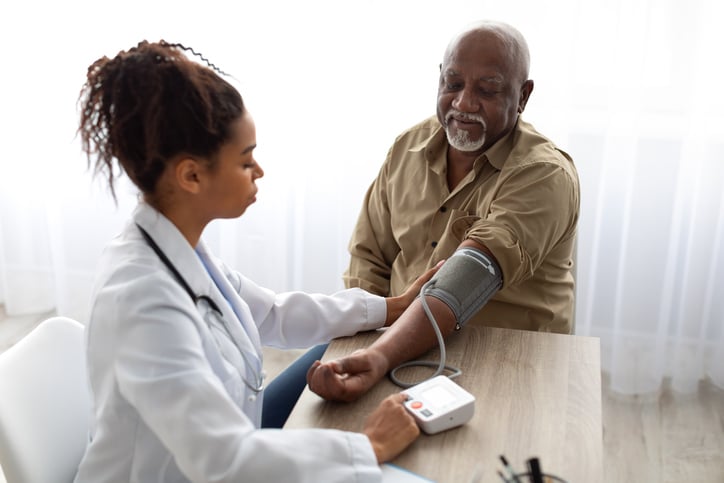
Hypertensive crisis definition:
Hypertensive crisis —severe, rapid increase in blood pressure with a systolic reading of 180 (mm Hg) or higher or a diastolic reading of 120 (mm Hg) or higher. Blood pressure this high can damage blood vessels and organs, including the heart, brain, kidneys and eyes and the heart may not be able to pump blood as effectively as it should. Hypertensive crisis can lead to stroke or heart attack.
When patients present with hypertensive crisis, immediate evaluation is needed to assess organ function and determine an appropriate treatment.
A patient without a diagnosis of hypertension may have a hypertensive crisis even with blood pressure reading lower than 180/120 mm Hg. Hypertensive crisis is uncommon in children but if a sudden severe increase in a child’s blood pressure occurs, they will require immediate intervention to prevent harmful consequences.
Causes of hypertensive crisis include:
- Medication noncompliance or medication reaction/interaction with other drugs
- Stroke, MI, heart failure, renal failure
- Tumor of the adrenal gland (pheochromocytoma)
- Eclampsia
Signs and symptoms of hypertensive crisis include:
- Severe chest pain/Shortness of breath
- Severe headache that may be associated with blurred vision and confusion and/or seizures
- Nausea & Vomiting
- Unresponsiveness
- Nosebleed
- Marked anxiety
- Swelling/edema
Hypertensive crisis is divided into two types:
- Hypertensive urgency—Hypertensive crisis with no sign of organ damage
- Hypertensive emergency—Hypertensive crisis with life-threatening organ damage
Coding for hypertensive crisis
In ICD-10-CM, codes for hypertensive crisis are further specified based on severity with codes available for hypertensive urgency, hypertensive emergency and hypertensive crisis of unspecified severity.
|
I16 Hypertensive Crisis |
|
I16.0 Hypertensive urgency |
|
I16.1 Hypertensive emergency |
|
I16.9 Hypertensive crisis, unspecified |
Both the ICD-10-CM coding guidelines and the instructional note for category I16 direct the coder to “Code also any identified hypertensive disease (I10-I15, I1A)”. Use of the “Code also” note and the instruction in guideline I.C.9.a.10 indicate sequencing is based on the reason for the encounter.
Coders should also be aware of the “Code first specific type of existing hypertension, if known” instructional note associated with code I1A.0 Resistant hypertension. This is a note that specifically directs sequencing of codes from categories I10 or I15 before code I1A.0.
If a patient has hypertensive urgency/emergency due to resistant hypertension, it will take careful review of the documentation and instructional notes to determine appropriate code sequencing.
References
- ICD-10-CM Official Guidelines for Coding and Reporting I.C.9.a.10
- http://www.mayoclinic.org/diseases-conditions/high-blood-pressure/expert-answers/hypertensive-crisis/FAQ-20058491
In need of coding support? We offer both inpatient coding support and outpatient coding support services. Partner with us to replace underperforming coding vendors, get coding backlogs caught up, staff for a FMLA/vacation gap, special projects, to assist in Single Path Coding, or for Total Outsource Coding Support.
The information contained in this coding advice is valid at the time of posting. Viewers are encouraged to research subsequent official guidance in the areas associated with the topic as they can change rapidly.
Subscribe to our Newsletter
Recent Blogs
Related blogs from Industry News , Medical Coding Tips
CMS Hospital Compare is a public reporting pl...
Premier benchmarking is widely used by hospit...
PEPPER reports help U.S. hospitals identify o...
CMS has released the updates to the ICD-10-PC...
Subscribe
to our Newsletter
Weekly medical coding tips and coding education delivered directly to your inbox.


.png)


